Herb Gardening: Grow Your Own Flavorful Oasis
Growing a herb garden is more than just a hobby. It’s a lifestyle choice that can deeply affect your health, well-being, and the environment. Whether you’re a pro or a beginner, having your own herbs brings many benefits. This guide will show you the joys of herb gardening, its environmental impact, health perks, starting your garden, and creative ways to use your herbs.
Key Takeaways
- Herb gardening provides enhanced flavor and aroma in dishes, according to over 60% of gardeners.
- Growing herbs can lead to significant cost savings compared to store-bought alternatives.
- Herbs offer various health benefits due to their medicinal properties and essential nutrients.
- 70% of herb gardeners have experienced reduced stress levels and increased mental clarity.
- Proper sunlight, soil preparation, and maintenance are crucial for thriving herb gardens.
The Joy of Growing Your Own Herbs
Starting a herb garden is a rewarding experience. It connects you to nature and gives a sense of accomplishment. It’s also a great way for families to learn together.
Taking care of these plants is calming and helps reduce stress. Watching them grow from tiny seeds is rewarding. It shows the effort you put in.
Connection to Nature
Growing herbs at home helps you reconnect with nature. It’s a calming activity that lowers stress and anxiety. Over 75% of people who start growing herbs keep adding more to their gardens.
Sense of Accomplishment
Feeling proud of your herb garden is unmatched. Seeing your herbs grow and using them in cooking is empowering. Studies show that gardening can help with anxiety and depression.
Educational Experience
A herb garden is great for families to learn together. Kids learn about plants, healthy eating, and patience. It teaches them to appreciate nature and gardening.
Whether you’re new to gardening or experienced, growing herbs has many benefits. It connects you to nature, gives a sense of pride, and offers learning opportunities. The herb garden is a vibrant and rewarding experience.
The Environmental Impact of a Herb Garden
Growing your own herbs at home is good for the planet. It cuts down on the need for store-bought herbs, which can harm the environment. By doing this, you can reduce your carbon footprint.
A garden full of different herbs brings in bees and butterflies. These insects are key to pollination, helping local ecosystems and promoting biodiversity. Plus, you won’t have packaging waste since you can pick what you need.
Reduced Carbon Footprint
By growing your own herbs, you cut down on store-bought products. These products often have a big carbon footprint because of transport and packaging. Your sustainable gardening efforts can really lower your environmental impact and help the planet.
Promotes Biodiversity
A garden with many herbs draws in bees and butterflies. These insects are vital for pollination and keeping ecosystems healthy. By supporting biodiversity, you’re keeping nature in balance and giving a safe place to these pollinators.
Less Waste
With homegrown herbs, you only take what you need. This means less chance of food waste from plastic-packaged store herbs. This environmental benefit of herb gardens helps reduce waste and supports sustainable living.
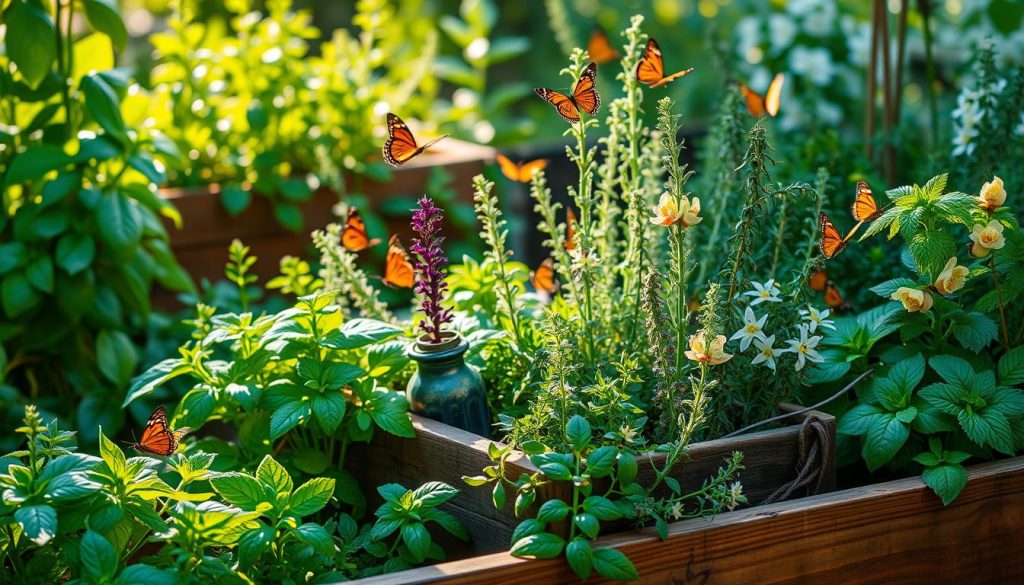
“Growing your own herbs is not only satisfying, but it can also have a positive impact on the environment. By reducing your carbon footprint, promoting biodiversity, and minimizing waste, you’re making a meaningful contribution to a more sustainable future.”
Health Benefits of Different Herbs
Herbs have been known for their health benefits for centuries. They are full of compounds that help our well-being. These include antioxidants, anti-inflammatory agents, and more. They are great for any garden or kitchen.
Basil is a top herb, full of antioxidants and anti-inflammatory properties. It supports the immune system and may lower cancer risk. Adding basil to your meals is easy and beneficial for your health.
Mint is great for digestion and tastes refreshing. It can also boost energy and improve gut health. Growing mint means you always have it on hand.
Herbs like rosemary and sage are also studied for their health benefits. They may fight cancer, boost brain function, and help oral health. These herbs are easy to grow at home.
Adding homegrown herbs to your life can improve your health and taste your food better. Discover the health perks of different herbs and start your herb garden now!
Basil: Antioxidant and Anti-Inflammatory Powerhouse
Basil is more than just a tasty herb. It’s a health superstar, packed with antioxidants and anti-inflammatory agents.
Health Benefits
Basil is full of vitamins and minerals like vitamin C, A, magnesium, K, and manganese. These help your body in many ways. For example, its antioxidants fight off free radicals, lowering the risk of heart disease and some cancers.
It also has anti-inflammatory compounds that help with conditions like arthritis. Basil can even help lower blood pressure and cholesterol, keeping your heart healthy.
Culinary Uses
Basil is a favorite in the kitchen for its unique taste. It makes pesto, sauces, salads, soups, and oils taste better. This herb can make any meal special.
For the best flavor, use fresh basil. But, dried basil is also good and easy to find, especially when fresh isn’t available.
Adding basil to your meals is a great way to boost your health and flavor. It’s a tasty and smart choice for anyone looking to eat better.

Mint: Digestive Aid and Cooling Relief
Mint is a versatile herb that helps with digestion and offers cooling relief. It has a refreshing aroma and flavor. It belongs to the Lamiaceae family and includes peppermint, spearmint, and wild mint.
Mint is great for digestive health. It helps with symptoms of irritable bowel syndrome (IBS), reduces nausea, and eases indigestion. The carminative and antispasmodic properties of mint soothe the stomach, making it a natural remedy for digestive issues.
Mint is also known for its cooling effects. The menthol in mint can soothe headaches, improve breathing, and cool the mouth. It’s often used in toothpaste, mouthwash, and chewing gum for these benefits.
| Mint Variety | Health Benefits | Culinary Uses |
|---|---|---|
| Peppermint | Digestive aid, respiratory support, analgesic | Teas, desserts, salads, drinks |
| Spearmint | Digestive aid, anti-inflammatory, antimicrobial | Teas, savory dishes, salads, garnishes |
| Wild Mint | Antimicrobial, antioxidant, insect repellent | Teas, infusions, skin care products |
In the kitchen, mint adds flavor to many dishes. It’s great in teas, lemonades, and salads. Its cooling taste also goes well with lamb, vegetables, and chocolate desserts.
If you’re looking to ease digestive issues, relieve respiratory problems, or just enjoy mint’s taste, this herb is a great choice. Add mint to your daily routine and see how it can improve your health.
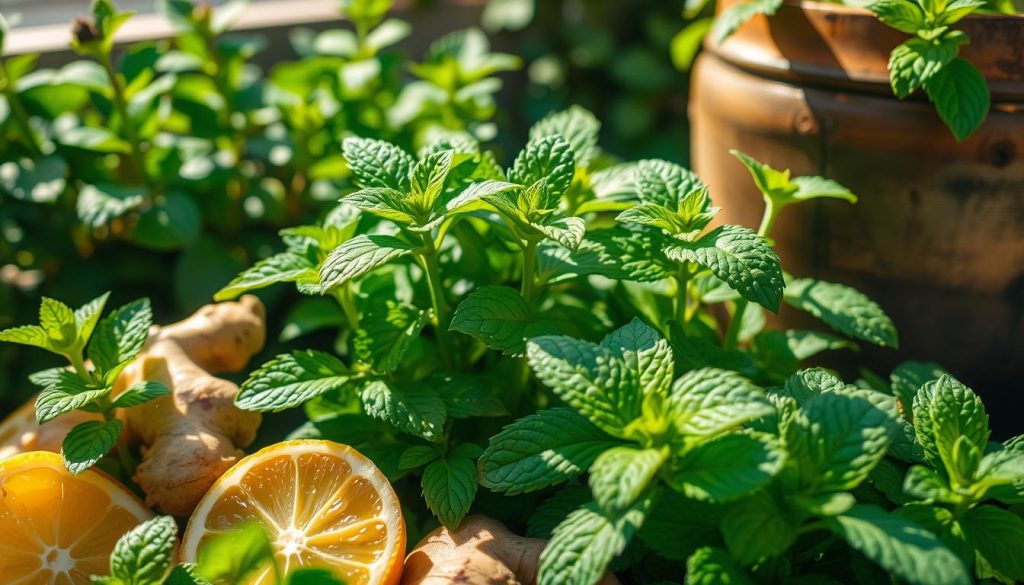
Thyme: Antimicrobial and Respiratory Support
Thyme is a versatile herb that offers many health benefits. It has potent antimicrobial properties and supports respiratory health. This fragrant herb is full of compounds that fight infections, ease breathing, and promote skin health.
Health Benefits
Thyme has a compound called thymol that fights bacteria and reduces inflammation. Research shows thymol can control infections. In a study, a thyme-based nasal spray helped 18 healthy people cough less.
Thymol and another compound, carvacrol, can thin mucus and soothe the respiratory tract. This helps ease chest congestion.
Thyme also helps with skin issues like eczema and acne. Its antimicrobial and anti-inflammatory properties make it great for cleaning and disinfecting your home.
Culinary Uses
In the kitchen, thyme is key in Mediterranean cuisine. It goes well with meats, vegetables, and stews. Fresh or dried thyme adds a savory flavor to many dishes.
Remember, thyme’s essential oils are strong, so use a little at first. Adjust to your taste. Thyme is also packed with vitamins C and A, and minerals like potassium and magnesium.
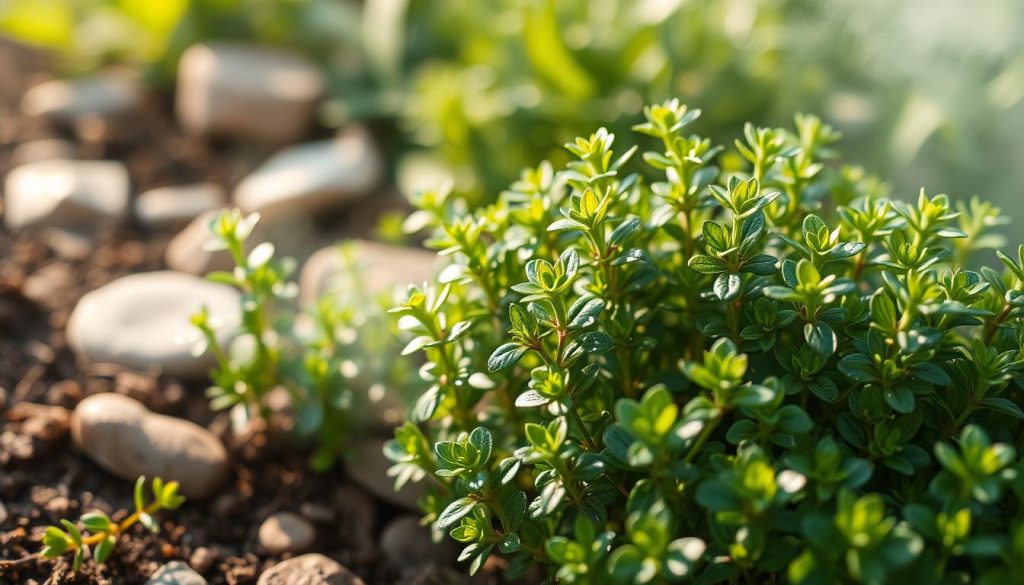
“Thyme is a versatile herb that offers a wide range of health benefits, from its potent antimicrobial properties to its ability to support respiratory health.”
Rosemary: Memory Booster and Brain Protector
Rosemary is a fragrant herb known for boosting brain health and cognitive abilities. It’s full of compounds like carnosic acid. These help protect the brain and might lower the risk of diseases that affect the brain.
Research shows rosemary can make you feel more alert, sleep better, and remember things more clearly. A study in 2018 found that students who took rosemary supplements for a month did better in memory tests. The antioxidants and anti-inflammatory effects in rosemary are key to these benefits.
Rosemary also has many other health perks. It’s full of iron, calcium, and vitamin B6, making it a great addition to your diet. Studies now suggest it can help with skin issues, treat nerve pain, and even fight cancer.
| Health Benefits of Rosemary | Supporting Research |
|---|---|
| Improved mental energy and sleep quality | 2020 study of 42 Japanese men |
| Enhanced memory performance | 2018 randomized controlled trial with university students |
| Cognitive enhancement in animals | 2021 review of animal research |
| Potential neuroprotective effects | Carnosic acid in rosemary fights free radical damage |
| Potential benefits for Alzheimer’s patients | Rosemary aromatherapy may improve cognitive function |
Rosemary is usually safe to eat in small amounts, but talk to a doctor before using essential oils or supplements. They can be different in quality. With its many benefits for rosemary health, rosemary cognitive function, and rosemary brain protection, it’s a great addition to your kitchen or garden.
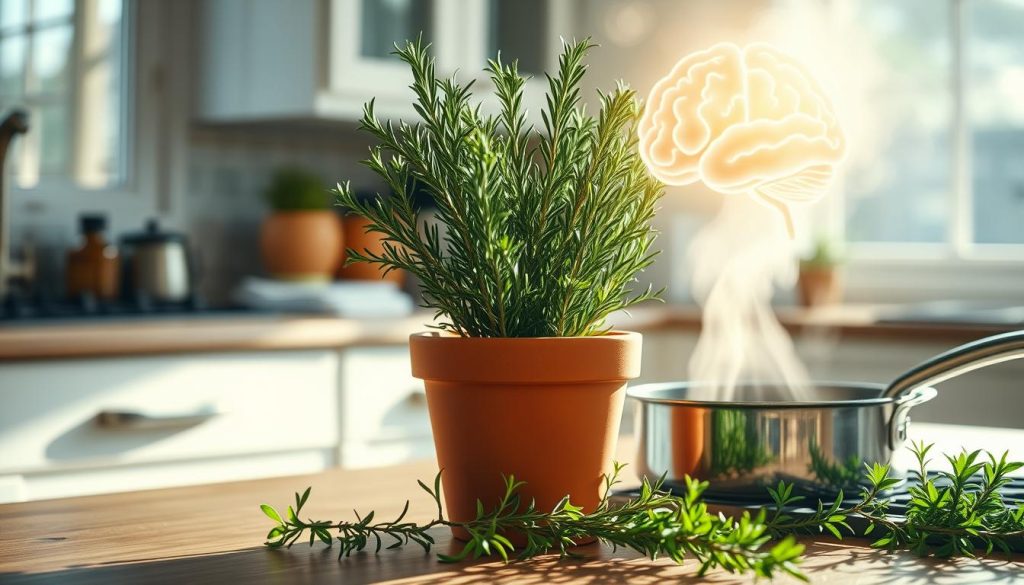
Oregano: Immune System Enhancer
Oregano is a powerful herb from the mint family. It’s full of antioxidants and has strong antibacterial, antiviral, and antifungal properties. These make it great for boosting the immune system.
Health Benefits
Oregano contains compounds like carvacrol and thymol that fight off harmful microbes. Oregano oil is especially effective against bacteria that antibiotics can’t beat. It also reduces inflammation, which can help with various health problems.
Studies suggest oregano might help fight cancer and manage diabetes. Its antioxidants can prevent DNA damage and control blood sugar levels in type 2 diabetes.
Culinary Uses
Oregano is a key ingredient in many Mediterranean and Italian dishes. Its unique taste is perfect for sauces, marinades, and seasoning meats and veggies. Whether fresh or dried, it adds a special flavor to any dish.
Adding oregano to your meals is a tasty way to boost your immune system and health. It’s versatile and easy to use, making it a great choice for home cooks.
| Nutrient | Amount per 1 tbsp (2.5g) of Dried Oregano | % Daily Value |
|---|---|---|
| Calories | 8 | – |
| Total Fat | 0.2g | 0% |
| Sodium | 2mg | 0% |
| Potassium | 31mg | 1% |
| Total Carbohydrates | 1.6g | 1% |
| Dietary Fiber | 1.0g | 4% |
| Protein | 0.6g | 1% |
| Vitamin K | 8.3mcg | 10% |
| Vitamin A | 125IU | 3% |
| Calcium | 17mg | 2% |
| Iron | 0.6mg | 3% |
This table shows the nutrients in 1 tablespoon (2.5g) of dried oregano. It highlights its nutritional value and how it meets daily adult needs for important nutrients.
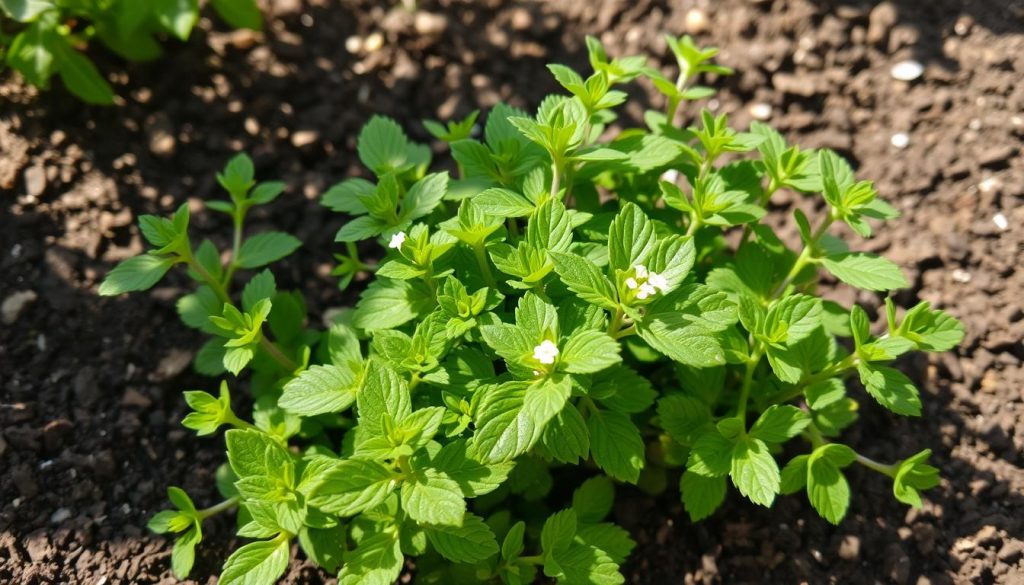
Parsley: Nutrient-Dense and Detoxifying
Parsley is more than just a garnish; it’s a nutrient-packed herb with many health benefits. It’s full of vitamins A, C, and K. These vitamins help with bone health, supporting the immune system, and detoxifying the body.
Parsley is also high in antioxidants. These help fight off harmful free radicals and remove excess fluids from the body. Research shows that parsley root juice can boost glutathione and detox enzymes in the liver. This means it can help with the body’s natural cleaning process.
A 3.5-ounce serving of parsley root is packed with nutrients. It gives you 55% of the daily value for vitamin C. It also has folate, potassium, magnesium, and zinc. This makes parsley great for supporting health and well-being.
| Nutrient | Amount per 3.5-ounce (100g) Serving | Percentage of Daily Value |
|---|---|---|
| Calories | 55 | – |
| Carbohydrates | 12g | – |
| Fiber | 4g | – |
| Vitamin C | 55mg | 55% |
| Folate (Vitamin B9) | 45μg | 45% |
| Potassium | 554mg | 12% |
| Magnesium | 44mg | 11% |
| Zinc | 1.3mg | 13% |
In the kitchen, parsley is a staple in Middle Eastern cuisine, especially in tabbouleh. It also brightens salads, soups, and many other dishes. Adding parsley to your meals can boost your nutrient intake, support detoxification, or just add flavor. It’s an easy way to make your diet more nutritious.
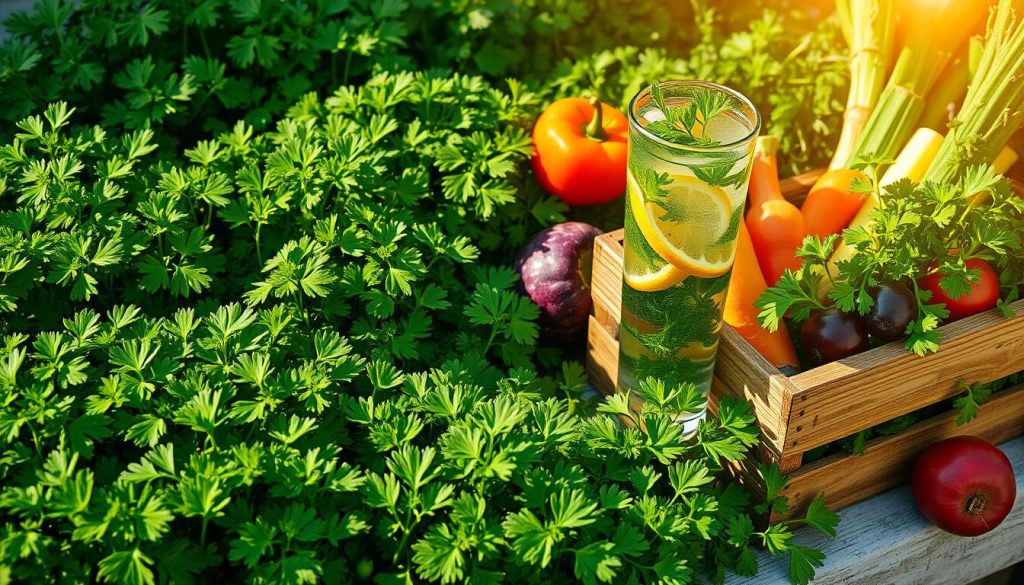
Sage: Cognitive Enhancement and Oral Health
Sage is a versatile herb with a long history of use in medicine and cooking. It’s known for its health benefits, especially in improving brain function and oral health. Studies show it can boost memory, attention, and support brain health.
Health Benefits
Sage is packed with antioxidants and anti-inflammatory compounds like rosmarinic acid and tanshinone IIA. These help protect the brain from aging and lower Alzheimer’s disease risk. Eating sage can also make cognitive tasks easier, improve mood, and help with remembering things faster.
It also helps keep your mouth healthy. Sage mouthwash can kill bacteria that cause cavities and fight other dental infections. This makes sage a great tool in the fight against tooth decay and gum problems.
Culinary Uses
In the kitchen, sage is great with rich meats like pork. It adds flavor to many dishes, from stuffings to soups. Its unique taste brings depth to food, making it a favorite in many kitchens.
Sage is amazing for your brain, mouth, and taste buds. Adding it to your meals can be a simple way to improve your health and enjoy your food more.
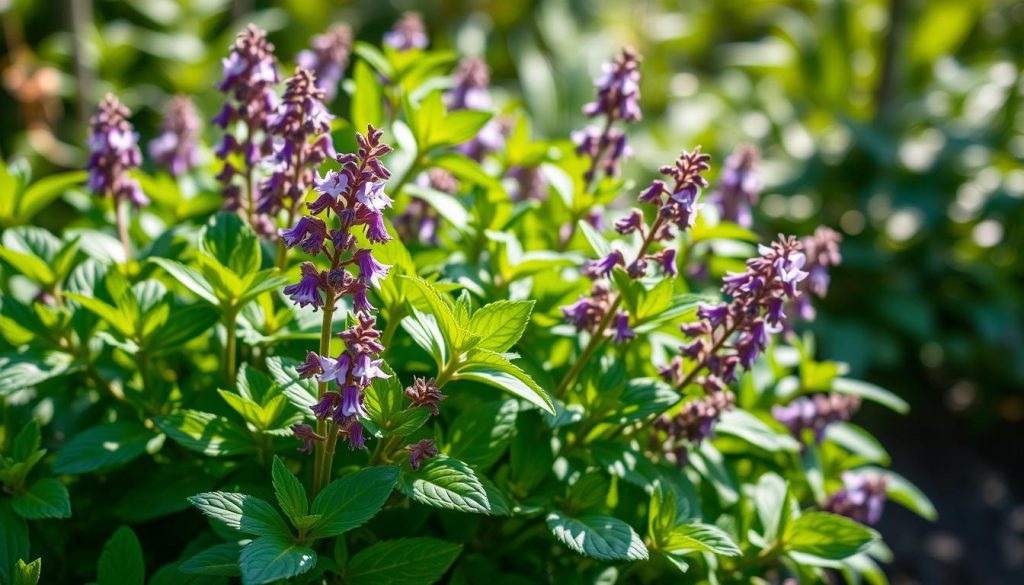
| Sage Health Benefits | Sage Cognitive Function | Sage Oral Health |
|---|---|---|
|
|
|
How to Start Your herb gardening
Start your herb gardening journey with ease! Whether you’re a pro or new to gardening, growing your own herbs is easy. This guide will help you pick the perfect spot and harvest your herbs.
Selecting the Right Location
Choosing the right spot is key for a successful herb garden. Most herbs love full sun, needing 7 to 8 hours of sunlight. But, some like cilantro and mint can do well with 3 to 4 hours of sun. Make sure the soil drains well, as herbs don’t like wet feet.
Choosing Your Herbs
Think about what you like to cook and your local growing conditions when picking herbs. This article covers 14 popular herbs, each with unique health benefits and flavors. Pick the ones that match your taste and needs.
Preparing the Soil
Herbs do best in soil that drains well. Add compost or aged manure to improve the soil. Raised beds work well for herbs and usually need little extra work.
Planting Your Herbs
Plant your herbs at the right distance and depth. Keep the soil moist but not too wet. Use Miracle-Gro® Moisture Control® Potting Mix to manage moisture. Containers need good drainage to prevent waterlogged soil.
Watering and Maintenance
Watch how much water your herbs need. Some, like basil, like moist soil, while others, like thyme, can handle drought. Check your herbs every day, especially in hot or dry weather, and water as needed. Young herbs might need a little food, like Miracle-Gro® every week or two.
Harvesting
Harvesting often makes your herbs grow bushy and full. Take no more than one-third of the plant at a time. Harvest before they flower for the best flavor and smell. Store your herbs by freezing, drying, or using them in recipes to enjoy them all year.
Creative Uses for Your Homegrown Herbs
Growing your own herb garden opens up a world of culinary and creative possibilities. Once your using homegrown herbs are thriving, explore the many ways to use them in your daily life. You can infuse oils and vinegars or create herbal-inspired home decor, among other things.
Culinary Delights
Boost your cooking with the fresh, vibrant flavors of your herb garden projects. Make delicious herb-infused butter to top grilled meats or roasted veggies. Try brewing herbal teas for a cozy afternoon. Infuse vinegars and oils to add a unique twist to salads and marinades.
Health and Wellness
Use your herb infused products for natural health and wellness. Make herbal tinctures, salves, and poultices for various ailments, like soothing sore muscles or boosting immunity. Enjoy the calming effects of herbs like lavender and chamomile with homemade sachets and diffusers.
Crafts and Home Décor
Bring your herb garden inside with creative DIY projects. Make dried herb bouquets and wreaths for your home. Create scented soy candles or herb-infused bath bombs for a luxurious self-care routine. Use your herbs to make sachets that can fragrance your closets and drawers.
The possibilities for using your homegrown herbs are endless. Embrace the versatility of your herb garden and let your creativity shine as you find new and innovative ways to use these plants in your life.
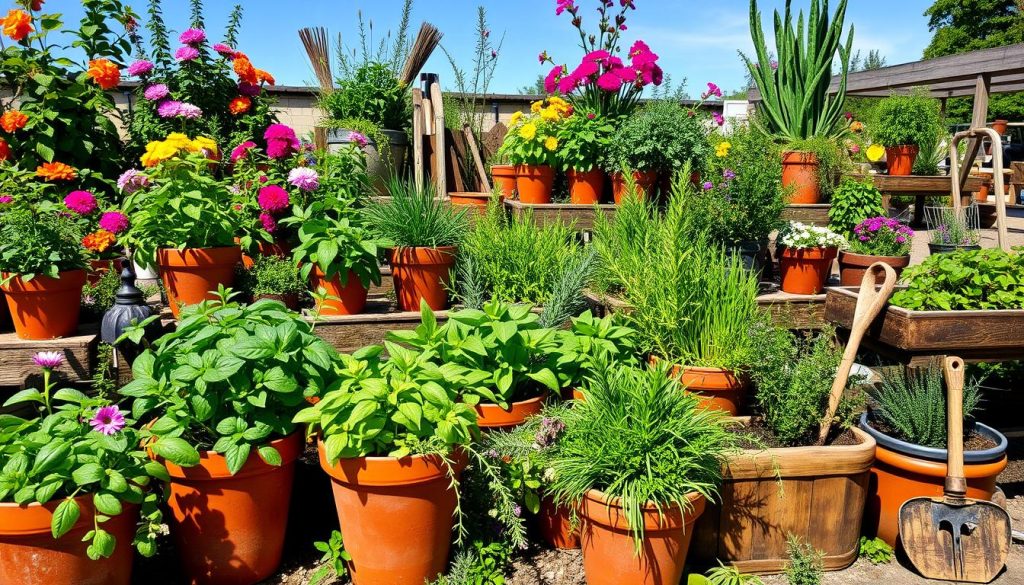
Troubleshooting Common Herb Garden Issues
Even the most skilled herb gardeners face challenges. Pests and improper watering are just a few issues that can harm your herb garden. Knowing these problems and how to fix them will help you keep your garden healthy and full of herbs.
Addressing Pest Invasions
Pests like aphids and spider mites can quickly take over an herb garden. Use organic methods to fight them, such as introducing helpful insects or neem oil. Check your garden often and act fast to keep pests away.
Overcoming Watering Woes
Watering your herbs right is key. Too little water can make them wilt and grow poorly. Too much water can cause root rot. Keep the soil moist but not soaked, and adjust how often you water based on the herbs you have.
Preventing Leggy Growth
If your herbs are getting too tall and thin, they probably don’t get enough sunlight. Move your garden to a spot with at least six hours of sunlight a day. Or, use extra lights if you’re growing them indoors.
| Common Herb Garden Issues | Potential Causes | Solutions |
|---|---|---|
| Pests | Aphids, spider mites, and other insects | Use organic pest control methods, introduce beneficial insects, apply neem oil |
| Improper Watering | Underwatering or overwatering | Maintain consistently moist (not waterlogged) soil, adjust watering schedule based on herb needs |
| Leggy Growth | Insufficient sunlight | Relocate to a spot with at least 6 hours of direct sunlight per day, or add supplemental lighting |
By solving these common herb garden problems, you can keep your herb garden healthy and full of fresh herbs. Use these troubleshooting tips to make sure your garden thrives.
Conclusion
Starting a herb garden is a rewarding journey with many benefits. It makes your meals taste better and boosts your health. Whether you’re new to gardening or have years of experience, growing your own herbs is fulfilling.
This article has given you the tools to start your own herb garden at home. You now know how to pick the right herbs and take care of them. With this knowledge, you can create a garden full of flavor and health benefits.
Embrace the joy of growing your own herbs and see the difference they make. With a little effort, your garden will thrive. It will give you fresh, healthy ingredients for cooking and support your well-being. Herb gardening is a journey of discovery, connection, and appreciation for nature.